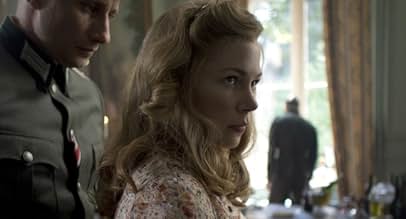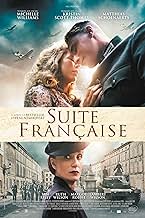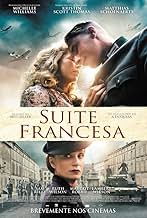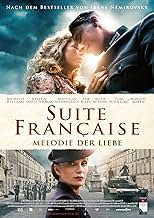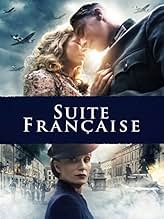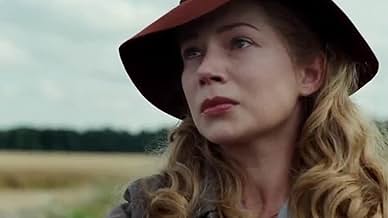Während der ersten Jahre der nationalsozialistischen Besatzung Frankreichs entsteht eine romantische Liebesbeziehung zwischen Lucile Angellier (Michelle Williams), einer französischen Dorfbe... Alles lesenWährend der ersten Jahre der nationalsozialistischen Besatzung Frankreichs entsteht eine romantische Liebesbeziehung zwischen Lucile Angellier (Michelle Williams), einer französischen Dorfbewohnerin, und Bruno von Falk (Matthias Schoenaerts), einem deutschen Soldaten.Während der ersten Jahre der nationalsozialistischen Besatzung Frankreichs entsteht eine romantische Liebesbeziehung zwischen Lucile Angellier (Michelle Williams), einer französischen Dorfbewohnerin, und Bruno von Falk (Matthias Schoenaerts), einem deutschen Soldaten.
- Regie
- Drehbuch
- Hauptbesetzung
- Für 1 Primetime Emmy nominiert
- 4 Nominierungen insgesamt
Empfohlene Bewertungen
The author of the original story, Irene Nemirovsky, was tragically sent to her death at the hands of the invading German army following bitter fighting during the occupation of France in 1942. Her husband, before he also was executed, gave their daughter Denise his wife's manuscripts. Denise, for emotional reasons did not read her mother's writings till an astounding 60yrs later. She eventually had them compiled into a novel that was published in 2002 - becoming an international best seller. Story rights were then sold for production as a screenplay. Denise sadly died just before the films release. To play the main protagonist producers cast Michele Williams (My week With Marilyn '11) mother to the late Heath Ledgers daughter. Considering some of William's earlier roles she is nothing short of remarkable - turning in a convincingly measured performance as the repressed Lucile Angellier.
This is more than a conventional wartime romantic movie as it deals realistically with the shocking impact of oppression and the devastating consequences it brings to all involved. Perhaps had the film makers paid a little less attention to the screenplays various sexual intrigues, they may have been able to treat us to those deleted scenes detailing the fascinating real life story - involving the writers daughter discovering her mothers work all those years after the event!. Director and co-screenplay writer Saul Dibb along with collaborating writer Matt Charman - join forces with director of photography Eduard Grau to create some remarkably atmospheric scenes. One well executed sequence featuring endless lines of displaced French families fleeing the relentless onslaught on foot, is a sad and dramatic sight.
Those who remain in their homes are met with enforced billeting of German Officers - this brings out the worst of human nature with neighboring villagers sending notes 'rating' on their fellow neighbor's to gain favour from the Germans - a shocking act indeed. Music plays a key role throughout the film with a romantic piano soliloquy composed by Alexandre Desplate played throughout. The exciting accompanying action score is contributed by Rael Jones. Overall this is a sincere portrait of a dreadful time in human history and while the the script may falter in several situations it's far more thoughtful than some other offerings along these lines. Performances are strong with a sterling cast of professionals working at their peak.
Note: This film is remarkably similar to an earlier production, staring the great Maria Schell "So Little Time" '52" - this marvelous classic film has recently been released on DVD in England and is more than well worth locating.
Scott Thomas is perfect as Madame Angellier, the icy mother in law with a twist. Williams and Schoenaerts are suitably reserved and understated as the star-crossed lovers. Sounds predictably tragic, but it is actually a very well made and interpreted movie. Also an engaging and believable love story, rather than a paint-by-number or a post-modern one.
The supporting cast is equally good, with a bunch of inhabitants - from the local gentry to the lowest peasants - in conflict with each other and foolishly thinking they can exploit the nasty German occupants to settle personal scores.
The melancholy of the story rings true, maybe because it is based on a novel written at the time of the events narrated. Definitely a refreshing experience in old-style storytelling – think "Casablanca", with slightly more gory details and less hope in the future of a beautiful friendship.
Lucile & Bruno's longing and desire for each other doesn't get frustrating or outrageously déjà vu, it only adds another flavor, to the many, in the film. It contrasts well with Celine's (Margot Robbie) lack of restraint on her urges. It begs the question on ideologies and desire, when do they impede each other? No one is just one dimensional in this film, you see the good, the bad, and questionable in every one. Ambivalence is the key word in this film, conflicting emotions and ideologies is in the center of this story.
The storytelling is just amazing, layered with subtlety and beauty, it carries you through every step of the way like musical notes played on the piano. The ensemble cast is great, all of the characters have some kind of layers to them, each of them memorable in their own way, without ever making the film crowded or hard to follow. Kristin Scott Thomas embodies the devotion her character has, Michelle Williams fits the role perfectly she has this quite strength that Lucile needs, and Matthias Schoenaerts really is the prince in the big bad wolf suit or vice versa.
Suite Française is a captivating and poignant story that has an equally emotive roots, the film surprised me. @wornoutspines
The characters in Suite Francaise are never to any measurable degree in control of their own fate. They are each controlled and constrained by social, economic and political prohibitions. In their own way each suffers a form of inequality of treatment, which leads to some form or other of dispossession.
For the lead characters, the young French wife and the German officer she comes to love, the most obvious inequality is their inability to form and sustain a loving relationship.They are constrained by political differences and social prejudices. Other characters experience dispossession as a result of a variety of factors such as class bias and racial discrimination. The loss in these cases, ranges from dispossession from property, through to deportation and death.
What is clear is the authors frustration and fury at the insanity of the world we live in. How so called civilizations and on a more local level individuals, demonstrate spitefulness and pettiness, (demonstrated by neighbours writing incriminating letters to the occupying German forces about one another) that prevent us all from leading free and happy lives.
This message is driven home all the more painfully and forcefully when you consider the tragic fate of the Jewish author, whose work this film is based upon. Sent to her death at a Nazi concentration camp simply for being Jewish.
The film adaption, derived from her incomplete series of books, is perhaps, a little stilted at times. This may in part be due to the fact the books were incomplete but possibly also due to the subtly of the message, which is not easily communicated in a ninety minute or so film.
In summary, Suite Francaise, is a thoughtful film. The compelling and heartfelt message which asks us all to practice kindness, understanding and tolerance when faced with its antithesis is as relevant in today's troubled times as ever it was. Eight out of ten from me.
Wusstest du schon
- WissenswertesThe movie is based on Irène Némirovsky's unfinished book "Suite Française" and focuses on the novel "Dolce". The book was only found after Némirovsky's death at a concentration camp in Auschwitz in 1942. Her elder daughter, Denise Epstein, kept the notebook containing the manuscript of Suite Française for fifty years without reading it, believing that it would indeed be a journal or diary too painful to read. In the late 1990s, however, having made arrangements to donate her mother's papers to a French archive, Denise decided to examine the notebook first. At last discovering what it contained, she instead had it published in France, where it became a bestseller in 2004.
- PatzerIn one of the last scenes where Michelle Williams is driving away, the camera pans out to a landscape shot. The adjacent wheat field clearly shows tracks of a sprayer used to dessicate the wheat - there was no such thing in 1940.
- Zitate
Lucile Angellier: Be careful... with your life.
Lieutenant Bruno von Falk: Is it precious to you?
Lucile Angellier: Yes. It is precious to me.
- Crazy CreditsNémirovsky's original hand-written manuscript of the novel is shown beneath the ending credits.
- VerbindungenFeatured in Projector: Home/Suite Française (2015)
- SoundtracksMusik Musik Musik
Composed by Peter Kreuder
Lyrics by Hans Fritz Beckmann
Performed by Otto Stenzel Tanzorchester feat. Wilfried Sommer
Top-Auswahl
- How long is Suite Française?Powered by Alexa
Details
- Erscheinungsdatum
- Herkunftsländer
- Offizielle Standorte
- Sprachen
- Auch bekannt als
- Suite Française
- Drehorte
- Produktionsfirmen
- Weitere beteiligte Unternehmen bei IMDbPro anzeigen
Box Office
- Budget
- 15.000.000 € (geschätzt)
- Weltweiter Bruttoertrag
- 9.337.930 $
- Laufzeit1 Stunde 47 Minuten
- Farbe
- Sound-Mix
- Seitenverhältnis
- 2.35 : 1
Zu dieser Seite beitragen





